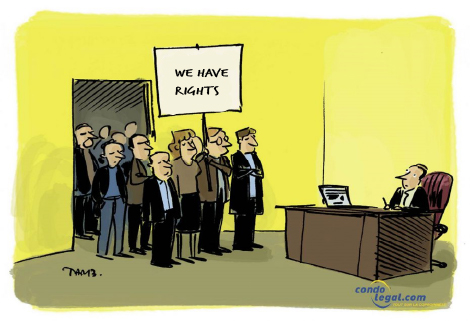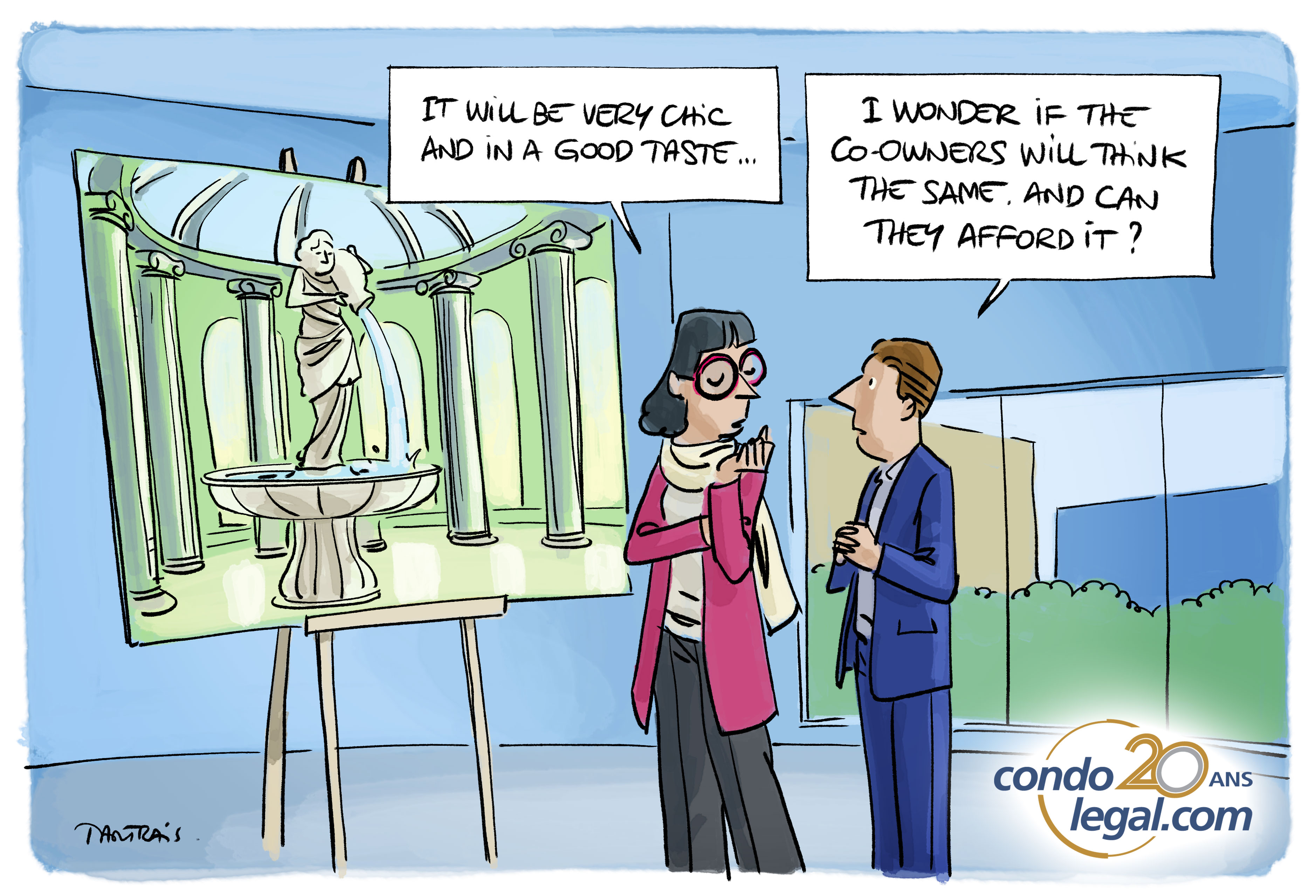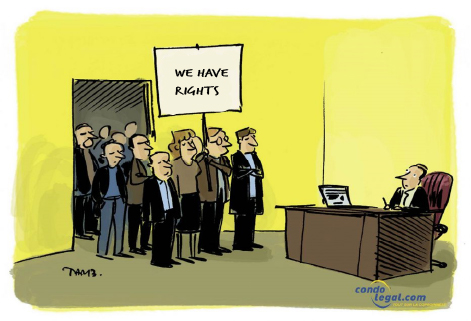Powers of the syndicate of co-owners
 The syndicate of co-owners is composed of all co-owners. Its powers are established in the collective interest of the co-owners, while respecting the individual rights guaranteed by the declaration of co-ownership and the Charter of Human Rights and Freedoms, particularly regarding the inviolability of the home. It acts as a legal entity, ensuring the proper management and preservation of the property for the benefit of all. Its powers focus on three main areas: preservation of the immovable through maintenance and repairs, administration of common portions, and defense of collective rights, with the ability to take legal action to protect co-owners' interests.
The syndicate of co-owners is composed of all co-owners. Its powers are established in the collective interest of the co-owners, while respecting the individual rights guaranteed by the declaration of co-ownership and the Charter of Human Rights and Freedoms, particularly regarding the inviolability of the home. It acts as a legal entity, ensuring the proper management and preservation of the property for the benefit of all. Its powers focus on three main areas: preservation of the immovable through maintenance and repairs, administration of common portions, and defense of collective rights, with the ability to take legal action to protect co-owners' interests.
Preservation of the immovable and administration of common portions
The obligation of the syndicate of co-owners to ensure the preservation of the immovable and the maintenance of the common portions is central to its mission. To fulfill this responsibility, the syndicate, through its board of directors, is vested with various powers enabling it to take the necessary measures to achieve this goal.
- Power to decide and carry out work in common portions: To prevent any degradation of the building, the syndicate has the authority to order and carry out necessary maintenance or repair work. This includes addressing issues affecting the building's structure or elements that endanger its integrity, such as the roof, foundations, or facades.
- Power to carry out work in private portions: In case of an emergency, the syndicate may quickly intervene, even in private portions, to carry out essential work to preserve the building. This power is crucial to maintaining the integrity of the co-ownership in unforeseen situations, such as water leaks or sudden structural issues.
- Power to finance work: To ensure building preservation, the syndicate is required to establish a contingency fund, approve specific budgets for maintenance and repair work, and allocate the costs among co-owners. If available funds are insufficient, it may also resort to loans to finance necessary repairs.
Some decisions, however, fall under the authority of the meeting of co-owners, such as:
Administration of common portions
The syndicate of co-owners has broad powers to ensure effective administration of the building's common portions, powers primarily exercised by the board of directors. The board has the authority to determine the necessary funds for the management and maintenance of the co-ownership and, after consulting the co-owners' assembly, to adopt the provisional budget by resolution. Additionally, the syndicate can issue assessment notices, sign contracts with essential service providers (such as snow removal and landscaping), and manage the co-ownership’s staff.
The syndicate may also delegate part or all of the day-to-day administration to a manager, while retaining control over important decisions. To achieve savings, it can partner with other syndicates of co-owners in a service-sharing approach.
Finally, certain decisions fall under the authority of the co-owners' assembly, such as the purchase or sale of fractions or common portions, the creation of easements, or the construction of new buildings to create additional fractions, in accordance with articles 1076, 1097, and 1098 of the Civil Code of Quebec.
Defense of collective and individual rights of co-owners
The syndicate of co-owners has specific rights that allow it to actively defend the collective and individual interests of co-owners. This mandate is derived from legal provisions, which supplement the rules ordinarily applicable to legal persons. As such, its mission in this respect is to protection of the rights appurtenant to the immovable or the co-ownership. To this end, the law grants it specific powers to enforce these rights, both civilly and in court, on behalf of the community of co-owners and individual co-owners. In this context, the syndicate has important powers to enforce the declaration of co-ownership and protect the collective rights. It can, for example:
- Request the court to order a co-owner to comply with the declaration of co-ownership, especially if non-compliance causes serious and irreparable harm to the syndicate or other co-owners;
- Collect common expenses from co-owners;
- Remove from office the director or the manager who, as a co-owner, fails to pay their contribution to the common expenses;
- Deprive of his voting rights any co-owner who has not paid his share of common expenses for more than three months;
- Publish a notice of legal hypothec on a co-owner’s unit if they are more than 30 days in default of paying their share of the common expenses;
- Request the court to resiliate the lease of a private unit if a tenant's non-compliance with obligations causes serious harm to another occupant or co-owner of the building;
- Terminate (without penalties) a contract entered into by the interim director for the maintenance of the immovable, or of any other nature, after the election of a new Board of Directors. Such contracts (that may be ended) must exceed one year, in which case the new directors will have 60 days (following their election) to terminate the contracts.
It can also initiate legal action based on a latent or construction defect, faulty design, or defect in the ground. Article 1081 of the Civil Code of Quebec allows it to take legal action for hidden or construction defects affecting the building, including in private portions, with the consent of the affected co-owners. In a 2022 ruling, the Court of Appeal even broadened the interpretation of this article, covering all personal claims of co-owners, including the annulment or reduction of the price, as well as damages. Therefore, the syndicate must be able to claim not only its own damages and those suffered by co-owners when a defect affects private portions, but also the damages suffered by co-owners resulting from a defect affecting the common portions.
 WHAT YOU SHOULD KNOW! The syndicate of co-owners insures the protection of the collective interests of the co-owners. Its legal personality is unique. Its actions are generally dictated by the board of directors.
WHAT YOU SHOULD KNOW! The syndicate of co-owners insures the protection of the collective interests of the co-owners. Its legal personality is unique. Its actions are generally dictated by the board of directors.
 WHAT TO KEEP IN MIND: In the section known as the constituting act of the co-ownership, the declaration of co-ownership establishes the nature of the powers conferred on the meeting of co-owners and the board of directors. This ability to act is fully aligned with the syndicate's missions, which include safeguarding common interests and respecting the rights of each co-owner while ensuring the diligent management of the co-ownership.
WHAT TO KEEP IN MIND: In the section known as the constituting act of the co-ownership, the declaration of co-ownership establishes the nature of the powers conferred on the meeting of co-owners and the board of directors. This ability to act is fully aligned with the syndicate's missions, which include safeguarding common interests and respecting the rights of each co-owner while ensuring the diligent management of the co-ownership.
 WARNING! The syndicate of co-owners could incur civil liability if it does not fulfill its mission properly, for example by not enforcing the declaration of co-ownership or by allowing co-owners to undertake irregular work.
WARNING! The syndicate of co-owners could incur civil liability if it does not fulfill its mission properly, for example by not enforcing the declaration of co-ownership or by allowing co-owners to undertake irregular work.
Back to the mega-factsheet: Syndicate





